初一下册英语知识点
七年级下册英语必背知识点
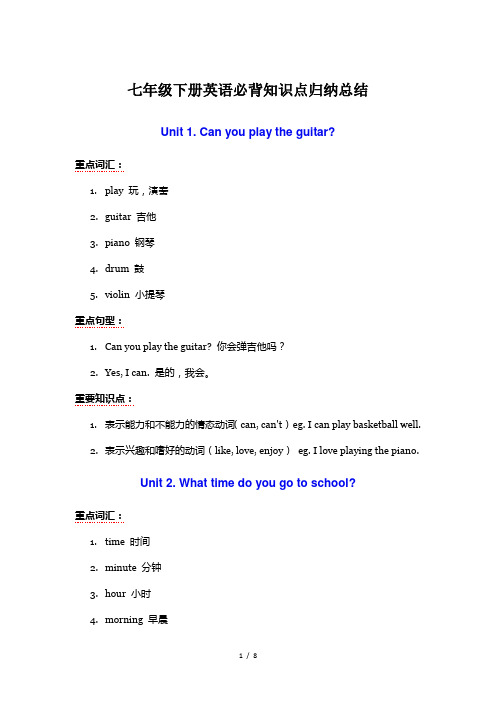
七年级下册英语必背知识点归纳总结Unit 1. Can you play the guitar?重点词汇:1.play 玩,演奏2.guitar 吉他3.piano 钢琴4.drum 鼓5.violin 小提琴重点句型:1.Can you play the guitar? 你会弹吉他吗?2.Yes, I can. 是的,我会。
重要知识点:1.表示能力和不能力的情态动词(can, can't)eg. I can play basketball well.2.表示兴趣和嗜好的动词(like, love, enjoy)eg. I love playing the piano.Unit 2. What time do you go to school?重点词汇:1.time 时间2.minute 分钟3.hour 小时4.morning 早晨5.afternoon 下午6.evening 晚上重点句型:1.What time do you get up? 你几点起床?2.I usually go to school at 7:30. 我通常七点半去上学。
重要知识点:1.表示时间的问答方式和用法eg. What time is it now? It's half past eight.2.表示日常生活习惯的一般现在时eg. I usually do my homework afterschool.Unit 3. How do you get to school?重点词汇:1.bike 自行车2.walk 步行3.bus 公交车4.subway 地铁5.taxi 出租车重点句型:1.How do you get to school? 你怎么去上学?2.I usually take the bus. 我通常坐公交车。
重要知识点:1.表示交通工具的名词和用法eg. I ride a bike to school every day.2.表示方式的副词和表达方式eg. He walks to work every morning.Unit 4. Don’t eat in class.重点词汇:1.don't do sth. 不要做某事2.eat 吃3.drink 喝4.talk 谈话5.listen 听6.music 音乐重点句型:1.Don't talk in class. 上课时不要讲话。
七年级下册英语知识点复习(完整版)
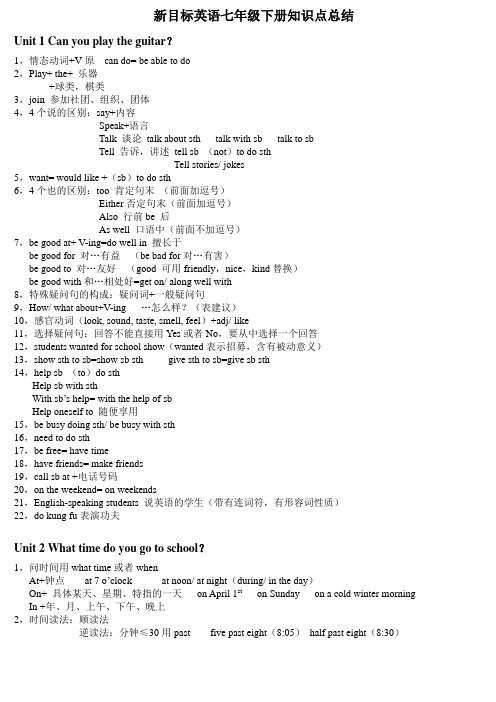
新目标英语七年级下册知识点总结Unit 1 Can you play the guitar?1,情态动词+V原can do= be able to do2,Play+ the+ 乐器+球类,棋类3,join 参加社团、组织、团体4,4个说的区别:say+内容Speak+语言Talk 谈论talk about sth talk with sb talk to sbTell 告诉,讲述tell sb (not)to do sthTell stories/ jokes5,want= would like +(sb)to do sth6,4个也的区别:too 肯定句末(前面加逗号)Either否定句末(前面加逗号)Also 行前be 后As well 口语中(前面不加逗号)7,be good at+ V-ing=do well in 擅长于be good for 对…有益(be bad for对…有害)be good to 对…友好(good 可用friendly,nice,kind替换)be good with和…相处好=get on/ along well with8,特殊疑问句的构成:疑问词+一般疑问句9,How/ what about+V-ing …怎么样?(表建议)10,感官动词(look, sound, taste, smell, feel)+adj/ like11,选择疑问句:回答不能直接用Yes或者No,要从中选择一个回答12,students wanted for school show(wanted表示招募,含有被动意义)13,show sth to sb=show sb sth give sth to sb=give sb sth14,help sb (to)do sthHelp sb with sthWith sb’s help= with the help of sbHelp oneself to 随便享用15,be busy doing sth/ be busy with sth16,need to do sth17,be free= have time18,have friends= make friends19,call sb at +电话号码20,on the weekend= on weekends21,English-speaking students 说英语的学生(带有连词符,有形容词性质)22,do kung fu表演功夫Unit 2 What time do you go to school?1,问时间用what time或者whenAt+钟点at 7 o’clock at noon/ at night(during/ in the day)On+ 具体某天、星期、特指的一天on April 1st on Sunday on a cold winter morning In +年、月、上午、下午、晚上2,时间读法:顺读法逆读法:分钟≤30用past five past eight(8:05)half past eight(8:30)分钟>30用to a quarter to ten(9:45)整点用…o’clock 7 o’clock(7:00)3,3个穿的区别:wear 表状态,接服装、手套、眼镜、香水等Put on 表动作,接服装Dress 表动作,接sb/ oneself get dressed穿衣3,感叹句:How+adj+主谓!How+adj+a/an +n单+主谓!What+ a/an +adj+ n单+主谓!What+ adj+ n复/ 不可数+主谓!4,from…to…5,be/ arrive late for6,频度副词(行前be 后)Always usually often sometimes seldom hardly never7,一段时间前面要用介词for for half an hour for five minutes8,eat/ have…for breakfast/ lunch/ dinner/ supper9,either…or10,a lot of=lots of11,it is +adj+for sb +to do sth (adj修饰to do sth)It is important for me to learn English.it is +adj+of sb +to do sth (adj修饰sb)It is kind/ friendly/ nice of you to help me.Unit 3 How do you get to school?1,疑问词How 如何(方式)how long 多长(时间)答语常用“(For/ about +)时间段”how far多远(距离)答语常用“(It’s +)数词 +miles/ meters/ kilometers”how often多久一次(频率)答语常用“Always/ often/ every day/…”或“次数+时间”等表频率的状语How soon多快,多久以后,常用在将来时中。
初一下册英语各单元知识点
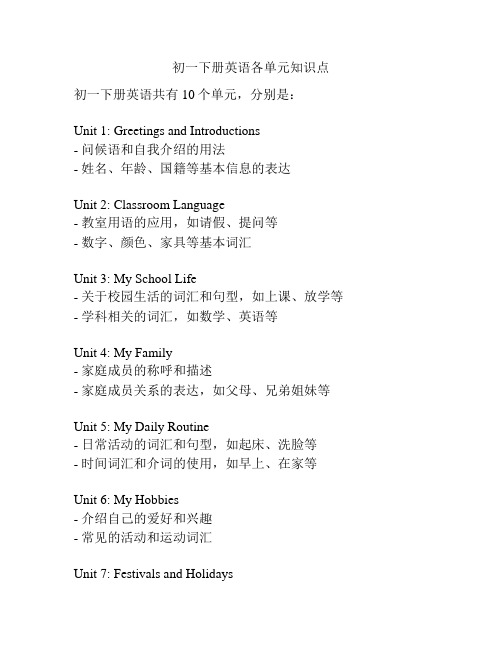
初一下册英语各单元知识点初一下册英语共有10个单元,分别是:
Unit 1: Greetings and Introductions
- 问候语和自我介绍的用法
- 姓名、年龄、国籍等基本信息的表达
Unit 2: Classroom Language
- 教室用语的应用,如请假、提问等
- 数字、颜色、家具等基本词汇
Unit 3: My School Life
- 关于校园生活的词汇和句型,如上课、放学等- 学科相关的词汇,如数学、英语等
Unit 4: My Family
- 家庭成员的称呼和描述
- 家庭成员关系的表达,如父母、兄弟姐妹等
Unit 5: My Daily Routine
- 日常活动的词汇和句型,如起床、洗脸等
- 时间词汇和介词的使用,如早上、在家等
Unit 6: My Hobbies
- 介绍自己的爱好和兴趣
- 常见的活动和运动词汇
Unit 7: Festivals and Holidays
- 介绍常见的节日和假期
- 相关的庆祝活动和特色食物等
Unit 8: My City
- 城市相关的地理和建筑物词汇- 指示方向和交通方式的表达
Unit 9: At the Restaurant
- 在餐厅用餐的基本用语和礼仪- 常见的食物和饮料词汇
Unit 10: Shopping
- 购物场景下的问询和购买方式- 常见商品和货币的表达。
七年级下英语知识点大全

七年级下英语知识点大全七年级下英语是中学英语学习的基础阶段,对学生掌握英语基本语法、词汇、语音、语调等方面起到关键作用。
本文将从以下几个方面为大家梳理七年级下英语的知识点大全。
一、语法1. 一般现在时和一般过去时的构成和用法;2. 肯定形式、否定形式、疑问形式和回答形式的句型构成;3. 简单句和复合句的区别和构成;4. 祈使句、感叹句、陈述句以及疑问句的用法和句型构成;5. 含有情态动词的句子的构成和用法。
二、词汇1. 基本词汇:数字、颜色、天气、家庭、职业、饮食、交通、娱乐、身体各部位、时间等;2. 动词的一般现在时和一般过去时的时态变化和用法;3. 常用介词、副词、形容词、代词、连词等的用法;4. 重点词汇:名词、动词、形容词、副词等的辨析;5. 常用短语和惯用语的用法和意义。
三、语音1. 英语元音、辅音的发音方法及发音区别;2. 重音、轻音的区别及在不同单词中的应用;3. 连读、缩读、语调等基本语音技巧的运用。
四、阅读1. 了解文章结构和主旨;2. 阅读理解的基本方法和技巧;3. 文章中的重点句型和重点词汇;4. 不同类型文章的写作风格和特点。
五、写作1. 熟悉英语的基本句型;2. 如何遣词造句地表达自己的观点;3. 写作技巧和写作准则;4. 书信格式、邮件格式、短文格式等不同类型写作的特点和要求。
六、听说1. 听力技巧和训练方法;2. 默写、听音辨词、听音辨意训练;3. 听力材料的种类和来源;4. 口语练习、语音训练等讲练结合的技巧。
以上就是七年级下英语知识点大全,每个知识点都是相互关联的,只有融会贯通,才能在英语学习中更快地进步。
在学习过程中,一定要注重日积月累,努力掌握基础知识,打牢英语学习的基础。
七年级下册英语语法知识点归纳总结
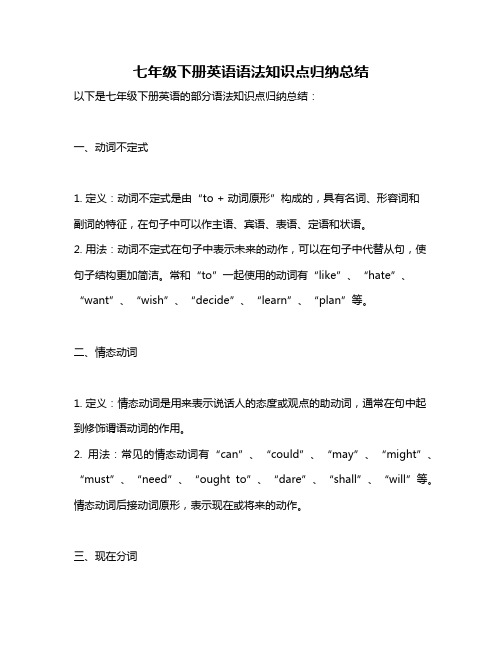
七年级下册英语语法知识点归纳总结以下是七年级下册英语的部分语法知识点归纳总结:一、动词不定式1. 定义:动词不定式是由“to + 动词原形”构成的,具有名词、形容词和副词的特征,在句子中可以作主语、宾语、表语、定语和状语。
2. 用法:动词不定式在句子中表示未来的动作,可以在句子中代替从句,使句子结构更加简洁。
常和“to”一起使用的动词有“like”、“hate”、“want”、“wish”、“decide”、“learn”、“plan”等。
二、情态动词1. 定义:情态动词是用来表示说话人的态度或观点的助动词,通常在句中起到修饰谓语动词的作用。
2. 用法:常见的情态动词有“can”、“could”、“may”、“might”、“must”、“need”、“ought to”、“dare”、“shall”、“will”等。
情态动词后接动词原形,表示现在或将来的动作。
三、现在分词1. 定义:现在分词是动词的一种形式,具有形容词的特征,可以表示正在进行的动作或状态。
2. 用法:现在分词可以作定语、表语和状语。
常和“-ing”一起使用的动词有“seeing”、“feeling”、“thinking”、“doing”、“being”等。
四、介词短语1. 定义:介词短语是由介词和名词或代词构成的短语,用来表示时间、地点、方式等。
2. 用法:介词短语在句子中可以作状语、定语和表语。
常见的介词有“in”、“on”、“at”、“for”、“with”、“by”等。
五、连词1. 定义:连词是用来连接两个句子或从句的词语,表示它们之间的关系。
2. 用法:常见的连词有“and”、“but”、“or”、“so”、“because”、“if”等。
连词在句子中起到承上启下的作用,使句子的意思更加清晰。
以上是七年级下册英语的部分语法知识点归纳总结,希望对你有所帮助。
初一下册英语知识点总结归纳

初一下册英语知识点总结归纳第一章 Hello! (你好!)1. 问候语:Hello! Hi! Good morning/afternoon/evening! How are you? I'm fine, thank you. And you?2. 家庭成员表达:father, mother, sister, brother, grandfather, grandmother等。
3. 介绍自己:My name is... I am... years old. I am a student. I come from...第二章 Classroom language (教室用语)1. 基本课堂用语:sit down, stand up, open your book, close your book, listen, repeat, read, write等。
2. 数字表达:1-20。
3. 询问问题:What's this/that? What color is it? Is it...? Are they...?第三章 My schoolbag (我的书包)1. 物品名称:book, pen, pencil, ruler, eraser, bag, pencil case等。
2. 形容词:big, small, long, short, tall等。
3. 数量词:one, two, three等。
4. 句型:This is my... These are my...第四章 My classroom (我的教室)1. 教室物品:desk, chair, blackboard, whiteboard, map等。
2. 位置词:in, on, under, behind等。
第五章 My body (我的身体)1. 身体部位:head, eyes, ears, nose, mouth, hand, arm, leg, foot等。
初一英语知识点(下册)
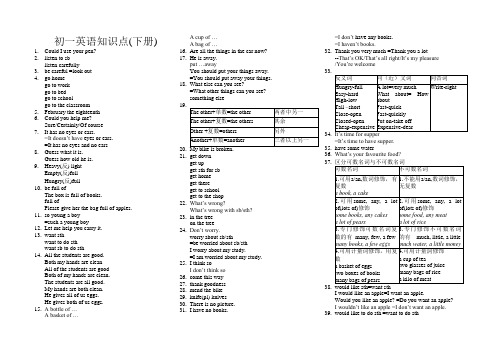
初一英语知识点(下册)1.Could I use your pen?2.listen to sblisten carefully3.be careful =look out4.go homego to workgo to bedgo to schoolgo to the classroom5.February the eighteenth6.Could you help me?Sure/Certainly/Of course7.It has no eyes or ears.=It doesn’t have eyes or ears.=It has no eyes and no ears8.Guess what it is.Guess how old he is.9.Heavy(反) lightEmpty(反)fullHungry(反)full10.be full ofThe box is full of books.full ofPlease give her the bag full of apples.11.so young a boy=such a young boy12.Let me help you carry it.13.want sthwant to do sthwant sb to do sth14.All the students are good.Both my hands are cleanAll of the students are goodBoth of my hands are clean.The students are all good.My hands are both clean.He gives all of us eggs.He gives both of us eggs.15.A bottle of …A basket of …A cup of …A bag of …16.Are all the things in the car now?17.He is away.put …awayYou should put your things away.=You should put away your things.18.What else can you see?=What other things can you see?something else19.20.21.get downget upget sth for sbget homeget thereget to schoolget to the shop22.What’s wrong?What’s wrong with sb/sth?23.in the treeon the tree24.Don’t worry.worry about sb/sth=be worried about sb/sthI worry about my study.=I am worried about my study.25.I think soI don’t think soe this way27.thank goodness28.mend the bike29.knife(pl) knives30.There is no picture.31.I have no books.=I don’t have any books.=I haven’t books.32.Thank you very much =Thank you a lot--That’s OK/That’s all right/It’s my pleasure/You’re welcome33.34.=It’s time to have supper.35.have some water36.What’s your favourite food?37.38.I would like an apple=I want an apple.Would you like an apple? =Do you want an apple?I wouldn’t like an apple =I don’t want an apple.39.would like to do sth =want to do sthI’d like to go home. =I want to go home.40.What would you like?41.something to drinksomething to eatsomething to playnothing to eat42.a piece of43.have some/much/no time to do sthI have no time to go home for lunch.44.have sports =do sport45.be good at sth=do well in sthbe good at doing sth =do well in doing sth 46.play basketballplay footballplay volleyball47.pass sth to sb =pass sb sthI pass a book to him. =I pass him a book.pass sth on to sb =pass on sth to sb48.Let me trytry sth on =try on sthtry to do sth49.want a go50.throw sth away51.fly a kite52.Throw it like this.Don’t throw it like that.53.54.55.basketball player56.on the school football team57.every dayevery Fridayevery Friday morning58.59.60.read a bookwatch TVwatch a football matchlook at the blackboardsee a filmsee a doctor61.draw a picture62.talk with sb63.open the door64.take photos65.66.67.go shopping68.at this time of day69.–What day is it today?-It’s Monday.70.–What’s the time? –It’s ten.-What time is it? –It’s ten.71.It’s open 24 hours.72.an English-Chinese dictionary73.give sth back to sbgive back sth to sbI give some money back to her=I give back some money to her.74.next Monday75.give sb a hand =help sbCan you give me a hand?=Can you help me?76.in the evening =at night77.May I speak to Jim? =Speaking78.There’s something wrong with the bike.There’s nothing wrong with the kite.=There isn’t anything wrong with the kite79.after classafter school80.help sb with sthhelp sb do sthhelp sb to do sth81.have a (good) rest82.It takes sb some time to do sthIt takes me an hour to do my homework.It takes time.83.I use a bike to go to school.=I go to school by bikeI use a knife to cut a cake.=I cut a cake with a knife84.at No. 14 Middle School85.have sth to do86.on Mondayon Tuesday morningon Wednesday afternoonon the night of Thursdayin the morning87.Can I get you something to drink?=Can I get something to drink for you?88.have a big breakfast89.three or four eggs90.That’s all.Is that all?91.worry about sb/sthbe worried about sb/sthDon’t worry about him.=Don’t be worried about him.92.How big is it?-It’s about this big.93.It looks very much like yours.He looks very much like his father.94.What does that say?-It says “closed”.95.learn sth from sbHe learns English from me.96.bring sth back97.98.99.have a meeting100.have something to do101.There is no difference.102.be friendly to sb103.have a good time=play happily104.Let’s be good friends.105.No smokingNo photosNo parking106.leave for school =go to school107.the map of the world108.How do you like China?=What do you think of China?-Very much109.What do you like about China?-The people and the food 110.Do you speak Chinese?-Yes, but only a little 111.the Great Wall 112.follow me 113.family namegiven name114.teach me Englishteach sb to do sth 115.stay herestay at home116.Here is a postcard from Lily to a friend in the USA 117.five days a weekgo out120.ask sb to do sthI ask them to have dinnerthey ask us to go to their homes for dinner. 121.write to sb 122.make friendsmake friends with sb 123.Jim is twelve.=Jim is twelve years old.=Jim’s age is twelve.=Jim is a twelve-year-old boy 124.all kinds ofdifferent kinds of126.morning meal =breakfastevening meal =supper 127.Do you like rice?Yes, I do. I like it a little.I like it very much(a lot). No, I don’t. I don’t like it at all. 128.have sth for breakfasteat sth for lunch129.Why don’t you go to the toy shop?=Why not go to the toy shop? 130.do the housework131.make phone calls to sbmake a phone call to sb give sb a call give a call to sb call sbtelephone sb 132.do some cookingdo some washing do some shopping do some cleaning 133.What else can I do?=What other things can I do?134.What does he do? =What is he? =What’s his job?What do you do?=What are you? =What’s your job? 135.Where does he work? 136.I want to be a writer.What do you want to be? 137.take turnsIt’s one’s turn to do sth 138.Nice to meet you.=Nice meeting you. 139.have a party140.Chinese medicine 141.in the day 142.make moneymake much money 143.at weekendon weekdays144.love to work for sb145.English books on Chinese medicineabout 146.When do you get up? 147.Class beginsClasses begin. Class is over. 148.right now149.wash one’s face 150.get homeget to school get to the shop 151.go shoppinggo swimming go fishing go boating152.I ride a bike to school.=I go to school on my bike. =I go to school by bike 153.on the playground 154.No news is good news.155.There is a bridge over the river. 156.in the sky157.How long does it take you to do your homework? 158.too much moneytoo many apples You eat too much.159.Don’t you usually come to school by bike?Yes, I do.160.Isn’t the sun bigger than the moon?-Yes, it is161.Walking is goodIs listening to music bad? No, it isn’t.162.It’s a fine day for walkingIt’s a fine day for a walk.163.The air today is nice and clean.The air today is very clean. 164.A is far (away) from BA is 5Km (away) from Bfar 与具体路程不能同时出现在一个句子当中 My home is far away.My home is 5Km from school.How far…?How far is your home from school?165.It’s about 10 minutes by bike.It’s about 20 minutes on foot.=It’s about 20 minutes’ walk.166.be late for school/ class/ work/ meeting167.stay in bedread in bed168.at the right time169.with tears in his eyesThe teacher comes in with books in his hand. 170.buy sth for sbbuy sb sth171.修饰不可数名词修饰可数名词A little肯定,一点儿 A few肯定,一些Little否定,几乎没有Few否定,几乎没有172.a kilo of applestwo kilos of meathalf a kilo of milk173.What things does it sell?174.twenty yuan a bagten yuan a kilofive yuan a bottle175.How much is the book?How much are the eggs?How much is the meat?176.May I help you?=Can I help you?=What can I do for you?-Yes, please/ No, thanks177.Here’s the money.178.Reading in bed is bad for eyes.179.How much is the pen?=What’s the price of the pen?180.No pains, no gains.日常交际用语简表(Daily Expressions in Communication)1. 问候Greetingsa. Good morning / afternoon / evening.Hello / Hi.How are you?b. Fine, thank you. And you?V ery well, thank you.2. 介绍Introductionsa. This is Mr / Miss / Mrs....b. How do you do?Nice / Glad to see / meet you.c. My name is...I'm a student / worker etc. (here).3. 告别Farewellsa. I think it s time for us to leave now.b. Goodbye! (Bye-bye! Bye!)See you later / tomorrow. (See you.)Good night.4. 打电话Making telephone callsa. Hello! May I speak to...?b. Hold on, please.He / She isn't here right now.Can I take a message for you?c. I'm calling to tell / ask you....d. Goodbye.5. 感谢和应答Thanks and responsesa. Thank you (very much).Thanks a lot.Many thanks.Thanks for....b. Not at all.That's all right.You're welcome.6. 祝愿、祝贺和应答Wishes, congratulations and responsesa. Good luck!Best wishes to you.Have a nice / good time.Congratulations!b. Thank you.c. Happy New Year!Merry Christmas!Happy birthday to you.d. The same to you.7. 意愿IntentionsI'm going to....I will....I'd like to....I want / hope to....8. 道歉和应答Apologies and responsesa. I'm sorry. (Sorry.)I'm sorry for / about....Excuse me.b. That's all right.It doesn't matter.That's nothing.9. 遗憾和同情Regrets and sympathyWhat a pity!I m sorry to hear....10. 邀请和应答Invitations and responsesa. Will you come to...?Would you like to...?b. Yes, I'd love to....Yes, it's very kind / nice of you.c. I'd love to, but....11. 提供(帮助等)和应答Offers and responsesa. Can I help you?What can I do for you?Here, take this / my....Let me...for you.Would you like some...?b. Thanks. That would be nice / fine.Thank you for your help.Yes, please.c. No, thanks / thank you.That's very kind of you, but....12. 请求允许和应答Asking for permission and responsesa. May I...?Can / Could I...?b. Yes / Certainly.Yes, do please.Of course (you may).That's OK / all right.c. I'm sorry, but....You'd better not.13. 表示同意和不同意Expressing agreement and disagreementa. Certainly / Sure / Of course.Yes, please.Yes, I think so.That's true.All right / OK.That's a good idea.I agree (with you).b. No, I don't think so.I'm afraid not.I really can't agree with you.14. 表示肯定和不肯定Expressing certainty and uncertaintya. I'm sure.I'm sure (that)....b. I'm not sure.I'm not sure whether / if....c. Maybe / Perhaps.15. 喜好和厌恶Likes and dislikesa. I like / love...(very much).I like / love to....b. I don't like (to)....I hate (to)....16. 谈论天气Talking about the weathera. What's the weather like today?How's the weather in...?b. It's fine / cloudy / windy / rainy, etc.It's rather warm / cold / hot / etc. today, isn't it?17. 购物Shoppinga. What can I do for you?May / Can I help you?b. I want / I'd like....How much is it?That's too much / expensive, I'm afraid.That's fine. I'll take it.Let me have...kilo / box, etc.c. How many / much do you want?What colour / size / kind / do you want?d. Do you have any other kind / size / colour, ect. ?18. 问路和应答Asking the way and responsesa. Excuse me. Where's the men's / ladies' room?Excuse me, can you tell me the way to...?How can I get to...? I don't know the way.b. Go down this street.Turn right / left at the first / second crossing.It's about...metres from here.19. 问时间或日期和应答Asking the time or date and responsesa. What day is (it)today?What's the date today?What time is it?What's the time, please?b. It's Monday / Tuesday, etc.It's January 10th.It's five o'clock / half past five / a quarter to five / five thirty, etc.It's time for....20. 请求Requestsa. Can / Could you...for me?Will / Would you please...?May I have...?b. Please give / pass me....Please wait (here / a moment).Please wait (for)your turn.Please stand in line / line up.Please hurry. 21. 劝告和建议Advice and suggestionsa. You'd better....You should....You need (to)....b. Shall we...?Let's....What / How about...?22. 禁止和警告Prohibition and warningsa. You can't / mustn't....If you..., you'll....b. Take care!Be careful!23. 表示感情Expressing certain emotionsa. 喜悦Pleasure, joyI'm glad / pleased / happy to....That's nice.That's wonderful / great.b. 焦虑AnxietyWhat's wrong?What's the matter (with you)?I'm / He's / She's worried. Oh, what shall I / we do?c. 惊奇SurpriseReally?Oh, dear!Is that so?24. 就餐Taking mealsa. What would you like to have?Would you like something to eat / drink?b. I'd like....Would you like some more...?Help yourself to some....c. Thank you. I've had enough. / Just a little, please.25. 约会Making appointmentsa. Are you free this afternoon / evening?How about tomorrow morning / afternoon / evening?Shall we meet at 4:30 at...?b. Yes, that's all right.Yes, I'll be free then.c. No, I won't be free then. But I'll be free....d. All right. See you then.26. 传递信息Passing on a messagea. Will you please give this note / message to...?b. asked me to give you this note.c. Thanks for the message.27. 看病Seeing the doctora. There's something wrong with....I've got a cough.I feel terrible (bad).I don't feel well.I've got a pain here.This place hurts.b. Take this medicine three times a day.It's nothing serious.You'll be all right / well soon.28. 求助Calling for helpa. Help!b. What's the matter?29. 处理交际中的障碍Language difficultiesPardon.Please say that again / more slowly.What do you mean by...?I'm sorry I can't follow you.I'm sorry I know only a little English.30. 常见的标志和说明Some common signs and instructionsBUSINESS HOURS FRAGILEOFFICE HOURS THIS SIDE UPOPEN MENUCLOSED NO SMOKINGPULL NO PARKINGPUSH NO PHOTOSON DANGER!OFF PLAYENTRANCE STOPEXIT PAUSEINSTRUCTIONS。
七年级下册英语知识点归纳总结

七年级下册英语知识点归纳总结一、词汇与短语1. 学校科目:Math, Science, History, Geography, English, Chinese, Art, Music, PE (Physical Education)2. 学校设施:Library, Canteen, Gym, Playground, Computer lab, Auditorium3. 常见动词:Play, Sing, Dance, Draw, Read, Write, Listen, Speak, Think4. 常见形容词:Big, Small, Happy, Sad, Tall, Short, Young, Old, Beautiful, Ugly5. 日常活动:Get up, Brush teeth, Take a shower, Eat breakfast, Go to school, Have classes, Do homework, Watch TV, Go to bed6. 常见名词:Book, Pen, Pencil, Eraser, Notebook, Teacher, Student, Parent, Friend7. 常见介词:In, On, Under, Behind, Between, Next to, Across from, Above, Below8. 常见副词:Quickly, Slowly, Carefully, Loudly, Quietly, Well, Badly, Often, Never二、语法要点1. 时态- 一般现在时:表示经常发生的动作或状态,如:I usually play soccer on weekends.- 一般过去时:表示过去某一时间发生的动作或状态,如:He visited his grandparents last weekend.- 一般将来时:表示将来某一时间将要发生的动作,如:Theywill go on a trip next month.2. 代词- 人称代词主格:I, You, He, She, It, We, They- 物主代词:My, Your, His, Her, Its, Our, Their- 反身代词:Myself, Yourself, Himself, Herself, Itself, Ourselves, Themselves3. 冠词- 不定冠词:A, An (用于单数可数名词前)- 定冠词:The (用于特指的人或物前)4. 介词短语- 表示时间:At + 时间点 (at 8:00), On + 具体日期 (on Monday)- 表示地点:In + 大地方 (in the library), At + 小地方 (at the bus stop)5. 简单句和并列句- 简单句:只有一个主谓结构的句子,如:The dog barks.- 并列句:用并列连词连接的两个或多个简单句,如:She is smart and she works hard.6. 情态动词- Can, Could: 表示能力或许可,如:Can you help me? Could you open the window?- May, Might: 表示可能性,如:It might rain later.- Must, Have to: 表示必须,如:You must do your homework. We have to go now.三、阅读理解技巧1. 快速浏览(Skimming):快速阅读文章,抓住主旨大意。
七年级下册英语全部语法知识点
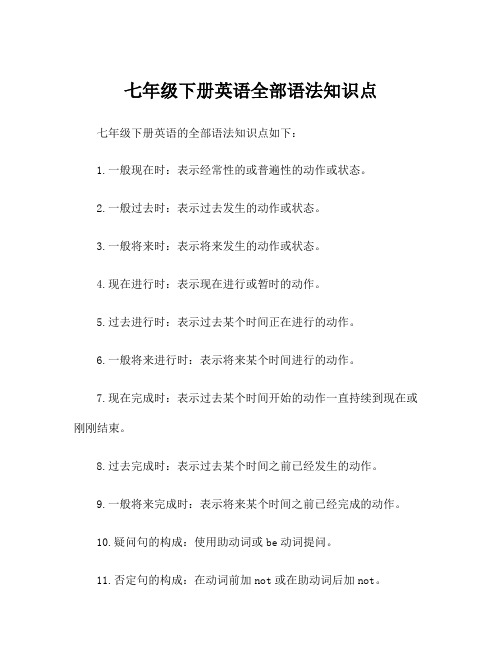
七年级下册英语全部语法知识点七年级下册英语的全部语法知识点如下:1.一般现在时:表示经常性的或普遍性的动作或状态。
2.一般过去时:表示过去发生的动作或状态。
3.一般将来时:表示将来发生的动作或状态。
4.现在进行时:表示现在进行或暂时的动作。
5.过去进行时:表示过去某个时间正在进行的动作。
6.一般将来进行时:表示将来某个时间进行的动作。
7.现在完成时:表示过去某个时间开始的动作一直持续到现在或刚刚结束。
8.过去完成时:表示过去某个时间之前已经发生的动作。
9.一般将来完成时:表示将来某个时间之前已经完成的动作。
10.疑问句的构成:使用助动词或be动词提问。
11.否定句的构成:在动词前加not或在助动词后加not。
12.肯定句的构成:直接陈述句子的内容。
13.比较级和最高级:用于比较两个或更多事物的形容词和副词。
14.表示数量的词汇:例如:all, most, some, any, few, a few, many, much等。
15.可数名词和不可数名词的用法。
16.单复数形式的变化规则。
17.形容词的用法和位置:用于修饰名词的词汇。
18.物主代词的用法:例如:mine, yours, his, hers, ours, theirs等。
19.反身代词的用法:例如:myself, yourself, himself, herself, ourselves, themselves等。
20.动词不定式的用法:用于表示目的、意图、结果等。
21.情态动词的用法:例如:can, could, may, might, must等。
22.介词的用法:表示位置、时间、原因、目的等。
23.祈使句的用法:用于发出命令、请求等。
24.从句的引导词和用法:例如:because, if, when, where, who等。
25.定语从句和状语从句的用法。
26.非谓语动词的用法:包括动词不定式、动名词和现在分词。
以上就是七年级下册英语的全部语法知识点。
初一下册英语知识点归纳总结()
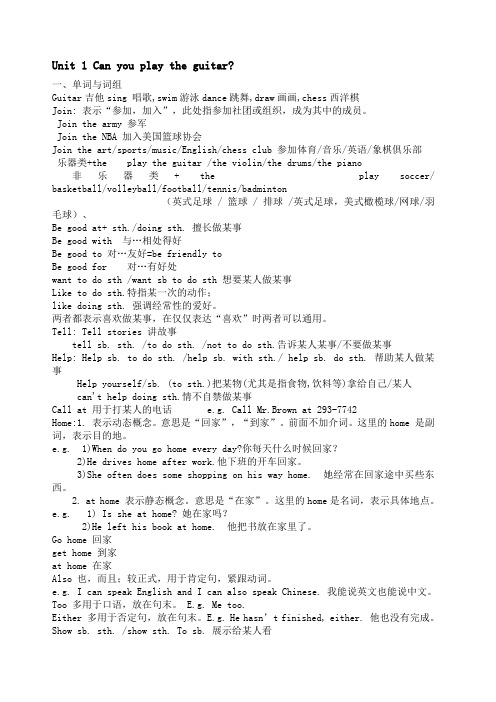
Unit 1 Can you play the guitar?一、单词与词组Guitar吉他sing 唱歌,swim游泳dance跳舞,draw画画,chess西洋棋Join: 表示“参加,加入”,此处指参加社团或组织,成为其中的成员。
Join the army 参军Join the NBA 加入美国篮球协会Join the art/sports/music/English/chess club 参加体育/音乐/英语/象棋俱乐部乐器类+the play the guitar /the violin/the drums/the piano 非乐器类+ the play soccer/ basketball/volleyball/football/tennis/badminton(英式足球 / 篮球 / 排球 /英式足球,美式橄榄球/网球/羽毛球)、Be good at+ sth./doing sth. 擅长做某事Be good with 与…相处得好Be good to 对…友好=be friendly toBe good for 对…有好处want to do sth /want sb to do sth 想要某人做某事Like to do sth.特指某一次的动作;like doing sth. 强调经常性的爱好。
两者都表示喜欢做某事,在仅仅表达“喜欢”时两者可以通用。
Tell: Tell stories 讲故事tell sb. sth. /to do sth. /not to do sth.告诉某人某事/不要做某事Help: Help sb. to do sth. /help sb. with sth./ help sb. do sth. 帮助某人做某事Help yourself/sb. (to sth.)把某物(尤其是指食物,饮料等)拿给自己/某人can't help doing sth.情不自禁做某事Call at 用于打某人的电话 e.g. Call Mr.Brown at 293-7742Home:1. 表示动态概念。
七年级英语下册知识点总结

• 三. A ______ baby can only cry.
•
A. two month B. two months C. two-month-old D.two months old
• 四.Our school is
[在...对面]my house.
• Look, There is _______ over there. Do you know him?
•
My uncle will leave for the USA.
•
三.离开A地去B地: leave +A + for +B
•
My uncle will leave China for the USA.
• 九、stop 作名词时为“站” bus top
•
作动词时为“停止”,句型为:stop doing sth.停止正在做的事
• He is afraid of dogs.
• He is afraid of crossing the river. • [二]be afraid to do sth. 害怕做某事 He is afraid to go out at night.
• 七、He is like a father to me.
◆句型结构梳理
• 一、距离的表达法 • “A+be+距离+from+B”表示A地离B地有多远 • My home is about 一0 kilometers from school. • “be far away from” 表示离......多远,但是有具体的距离时则不要用far. • My home isn’t far away from the school. • His home is five kilometers away from the school.
七下英语全书全部语法知识点总结

七下英语全书全部语法知识点总结Unit 1 Can you play the guitar?1. 情态动词+V原 can do= be able to do2. Play+ the+ 乐器+球类,棋类3. join 参加社团、组织、团体4. 4个说的区别:say+内容Speak+语言Talk 谈论 talk about sth talk with sb talk to sbTell 告诉,讲述 tell sb (not)to do sthTell stories/ jokes5. want= would like +(sb)to do sth6. 4个也的区别:too 肯定句末(前面加逗号)Either否定句末(前面加逗号)Also 行前be 后As well 口语中(前面不加逗号)7. be good at+ V-ing=do well in 擅长于be good for 对…有益(be bad for对…有害)be good to 对…友好(good 可用friendly,nice,kind替换)be good with和…相处好=get>8. 特殊疑问句的构成:疑问词+一般疑问句9. How/ what about+V-ing …怎么样?(表建议)10. 感官动词(look, sound, taste, smell, feel)+adj/ like11. 选择疑问句:回答不能直接用Yes或者No,要从中选择一个回答12. students wanted for school show(wanted表示招募,含有被动意义)13. show sth to sb=show sb sthgive sth to sb=give sb sth14. help sb (to)do sthHelp sb with sthWith sb’s help= with the help of sbHelp>15. be busy doing sth/ be busy with sth16. need to do sth17. be free= have time18. have friends= make friends19. call sb at +电话号码20.on the weekend= on weekends21. English-speaking students 说英语的学生(带有连词符,有形容词性质)22. do kung fu表演功夫Unit 2 What time do you go to school?1. 问时间用what time或者whenAt+钟点 at 7 o’clockat noon/ at night(during/ in the day)On+ 具体某天、星期、特指的一天on April 1st on Sunday on a cold winter morningIn +年、月、上午、下午、晚上2. 时间读法:顺读法逆读法:分钟≤30用pastfive past eight(8:05) half past eight(8:30)分钟>30用to a quarter to ten(9:45)整点用…o’clock 7 o’clock(7:00)3. 3个穿的区别:wear 表状态,接服装、手套、眼镜、香水等Put>Dress 表动作,接sb/>4. from…to…5. be/ arrive late for6. 频度副词(行前be后)Always usually often sometimesseldom hardly never7. 一段时间前面要用介词forfor half an hour for five minutes8. eat/ have… for breakfast/ lunch/ dinner/ supper9. either…or10. a lot of=lots of11. it is +adj+for sb +to do sth (adj修饰to do sth)It is important for me to learn English.it is +adj+of sb +to do sth (adj修饰sb)It is kind/ friendly/ nice of you to help me.12. 感叹句:How+adj+主谓!How+adj+a/an +n单+主谓!What+ a/an +adj+ n单+主谓!What+ adj+ n复/ 不可数+主谓!Unit 3 How do you get to school?1. 疑问词How 如何(方式)how long 多长(时间)答语常用“(For/ about +)时间段”how far多远(距离)答语常用“(It’s +)数词 +miles/ meters/ kilometers”how often多久一次(频率)答语常用“Always/ often/ every day/…”或“次数+时间”等表频率的状语How soon多快,多久以后,常用在将来时中。
七年级下册英语知识点大全
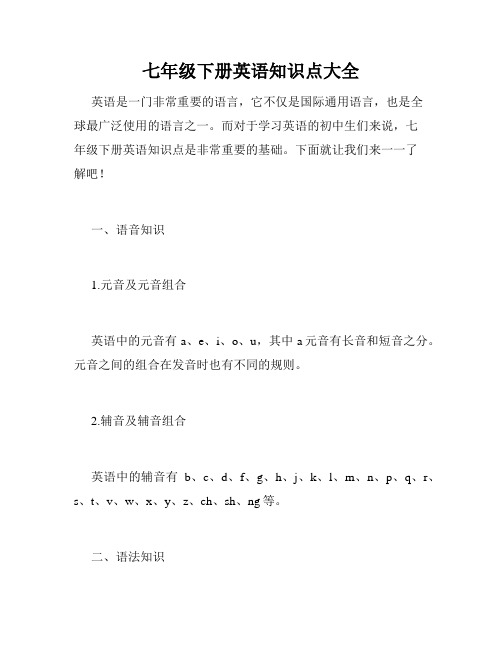
七年级下册英语知识点大全英语是一门非常重要的语言,它不仅是国际通用语言,也是全球最广泛使用的语言之一。
而对于学习英语的初中生们来说,七年级下册英语知识点是非常重要的基础。
下面就让我们来一一了解吧!一、语音知识1.元音及元音组合英语中的元音有a、e、i、o、u,其中a元音有长音和短音之分。
元音之间的组合在发音时也有不同的规则。
2.辅音及辅音组合英语中的辅音有b、c、d、f、g、h、j、k、l、m、n、p、q、r、s、t、v、w、x、y、z、ch、sh、ng等。
二、语法知识1.to be动词的变化be动词在不同的人称、单复数及时态下都有不同的变化。
如:I am, he is, we are等。
2.一般现在时表示现在正在进行的动作或状态,如:I go to school every day.3.一般过去时表示过去已经完成的动作或状态,如:I went to the park yesterday.4.现在进行时表示现在正在进行的动作或状态,并强调正在进行,如:I am reading a book now.5.将来时表示将要发生的动作或状态,如:I will go to the cinema tomorrow.6.形容词和副词的区别形容词用来修饰名词,描述人或物的特征;副词用来修饰动词、形容词或其他副词,描述动作或状态。
7.简单句和复合句简单句由主语和谓语组成;复合句由主句和从句组成。
三、词汇知识1.常用动词be、do、have、go、come、eat、see、get、make、like、want 等。
2.常用名词book、teacher、student、school、classroom、desk、bag、pen、homework、test等。
3.常用形容词和副词good、bad、happy、sad、big、small、fast、slow、hard、easy 等。
4.常用介词和连词in、on、at、with、for、to、and、but、or等。
七年级英语下册-全册知识点梳理
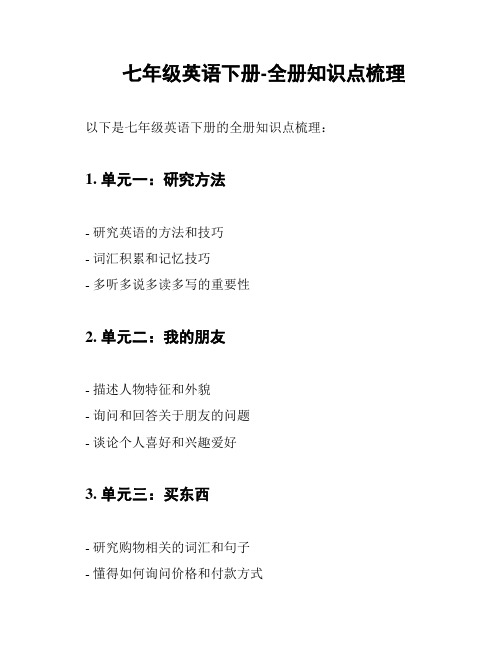
七年级英语下册-全册知识点梳理以下是七年级英语下册的全册知识点梳理:
1. 单元一:研究方法
- 研究英语的方法和技巧
- 词汇积累和记忆技巧
- 多听多说多读多写的重要性
2. 单元二:我的朋友
- 描述人物特征和外貌
- 询问和回答关于朋友的问题
- 谈论个人喜好和兴趣爱好
3. 单元三:买东西
- 研究购物相关的词汇和句子
- 懂得如何询问价格和付款方式
- 学会表达自己的购物意愿和偏好4. 单元四:我的学校
- 研究学校相关的词汇和句子
- 描述学校和课堂环境
- 谈论研究内容和学科
5. 单元五:我的生活
- 研究日常生活相关的词汇和句子- 描述自己的生活惯和家庭
- 谈论日常活动和时间安排
6. 单元六:我的假期
- 研究度假和旅行相关的词汇和句子- 描述过去和将来的假期计划
- 谈论旅行经历和感受
7. 单元七:我喜欢运动
- 研究运动项目和运动器材的词汇
- 喜欢和不喜欢的表达方式
- 谈论个人的体育运动经验和兴趣爱好
这份文档梳理了七年级英语下册的全册知识点,希望对你的学习有所帮助。
七年级下册英语单元全册知识点归纳与复习总结
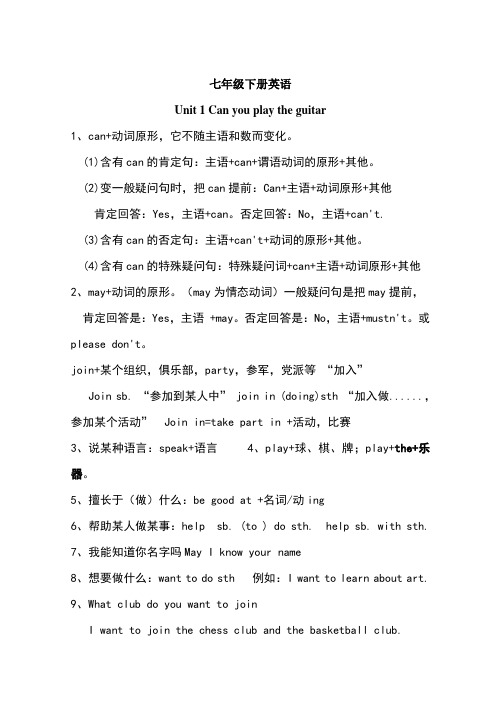
七年级下册英语Unit 1 Can you play the guitar1、can+动词原形,它不随主语和数而变化。
(1)含有can的肯定句:主语+can+谓语动词的原形+其他。
(2)变一般疑问句时,把can提前:Can+主语+动词原形+其他肯定回答:Yes,主语+can。
否定回答:No,主语+can't.(3)含有can的否定句:主语+can't+动词的原形+其他。
(4)含有can的特殊疑问句:特殊疑问词+can+主语+动词原形+其他2、may+动词的原形。
(may为情态动词)一般疑问句是把may提前,肯定回答是:Yes,主语 +may。
否定回答是:No,主语+mustn't。
或please don't。
join+某个组织,俱乐部,party,参军,党派等“加入”Join sb. “参加到某人中” join in (doing)sth “加入做......,参加某个活动” Join in=take part in +活动,比赛3、说某种语言:speak+语言4、play+球、棋、牌;play+the+乐器。
5、擅长于(做)什么:be good at +名词/动ing6、帮助某人做某事:help sb. (to ) do sth. help sb. with sth.7、我能知道你名字吗May I know your name8、想要做什么:want to do sth 例如:I want to learn about art.9、What club do you want to joinI want to join the chess club and the basketball club.10、What club does Tom want to join He wants to join the swimming club .11、He can’t play the violin or the piano. Can you help kids with swimming12、Why do you want to join the English club Because I want to learn English well.Unit 2 What time do you go to school1、what time和when引导的特殊疑问句。
英语七年级下册知识点归纳

七年级下册英语知识点归纳一、词汇1.重点单词-can(情态动词,能、会);dance(跳舞、舞蹈);swim(游泳);sing (唱歌);draw(画画);speak(说、讲);join(参加、加入);club(俱乐部);tell(告诉、讲述);story(故事、小说);write(写作、写字);show (演出、节目);or(或者、也不);talk(交谈、谈话);guitar(吉他);piano (钢琴);violin(小提琴);also(也、而且);people(人、人们);home (家、活动本部);make(使成为、制造);today(在今天、当今);center (中心、中央);weekend(周末);teach(教、讲授)。
-get up(起床、站起);dress(穿衣服、连衣裙);brush(刷、刷净);tooth(牙齿);shower(淋浴、淋浴器);usually(通常地、一般地);forty(四十);never(从不、绝不);early(早的);fifty(五十);job(工作、职业);work(工作);station(电(视)台、车站);o'clock(……点钟);night(晚上、夜晚);funny(奇怪的、滑稽好笑的);exercise(锻炼、练习);best(最好的、最好地);group(组、群);half(一半、半数);past(晚于、过(时间));quarter(一刻钟、四分之一);homework(家庭作业);run(跑、奔);clean(打扫、弄干净);walk(行走、步行)。
- take the subway / train / bus(乘地铁/火车/公共汽车);ride a bike / walk(骑自行车/步行);every day(每天);by bike / bus / subway(骑自行车/乘公共汽车/乘地铁);think of(认为);between…and…(在……和……之间);cross (横过、越过);river(河、江);many(许多);village(村庄、村镇);bridge (桥);boat(小船);ropeway(索道);year(年、岁);afraid(害怕、畏惧);like(像、怎么样);leave(离开、留下);dream(梦想、睡梦);true (真的、符合事实的)。
